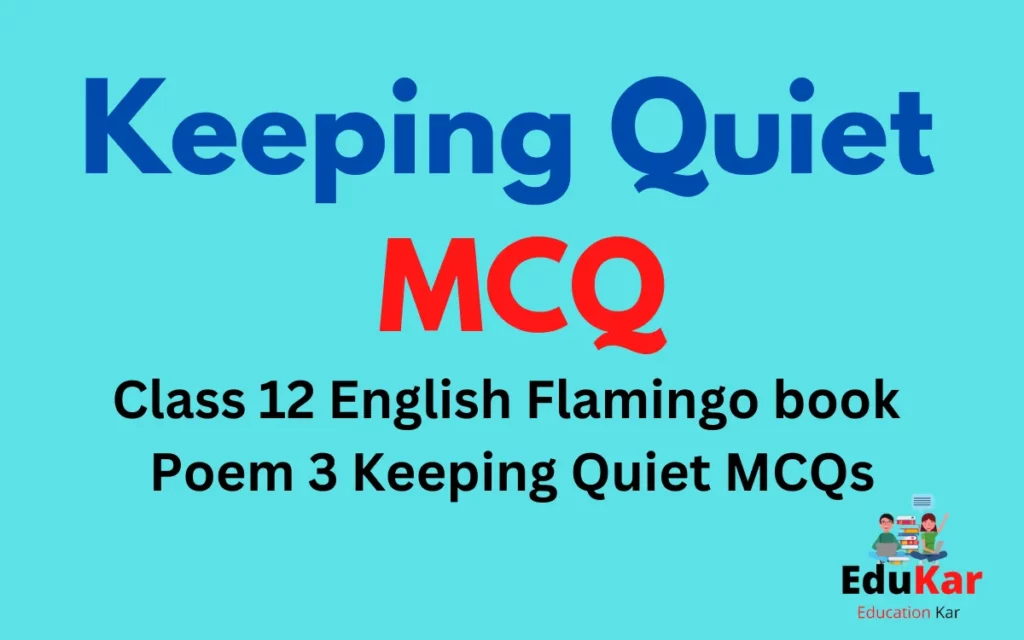
Q1- What does the poem’s title suggest?
A) Inactivity
B) noise
C) unhappiness
D) Maintenance of silence
Answer. D) Maintenance of silence
Q2- What is the subject of the poem?
A) the necessity to be happy
B) the need to reflect, comprehend, and feel a sense of fraternity
C) the necessity to work quietly
D) none
Answer. B) the need to reflect, comprehend, and feel a sense of fraternity
Q3- How can counting up to 12 be helpful? What does it mean?
A) hours of the day
B) months of a year
C) It will promote unity and peace.
D) all
Answer. D) all
Q4- What is the pen name of a poet?
A) Neruda
B) Pable
C) Pablo
D) Pablo Neruda
Answer. D) Pablo Neruda
Q5- What does the poet’s chosen writing style in this poem represent?
A) desires
B) happiness
C) hope
D) desire and hope
Answer. D) desire and hope
Q6- What language did the poem originally appear in?
A) English
B) French
C) Pali
D) Spanish
Answer. D) Spanish
Q7- What is the poem’s main point or message?
A) for more harmony and tranquillity, meditation and reflection
B) to prosper
C) to be happier
D) to reach out more people
Answer. A) for more harmony and tranquillity, meditation and reflection
Q8- What does the poet consider necessary for peace?
A) meeting with people
B) talking with people
C) interaction with the people
D) Soul searching
Answer. D) Soul searching
Q9- What causes barriers in the poet’s opinion?
A) interactions
B) reactions
C) fighting
D) languages
Answer. D) languages
Q10- Why does the poet want silence from the audience?
A) because it creates noise
B) he doesn’t like noise
C) it makes things unpleasant
D) because it causes misunderstandings between people, which serves as a barrier or hurdle.
Answer. D) because it causes misunderstandings between people, which serves as a barrier or hurdle.
Q11- What rhyme scheme does the poem use?
A) enclosed rhyme
B) Monorhyme
C) sonnet
D) Free verse
Answer. D) Free verse
Q12- How can remaining silent affect one’s outlook on life?
A) It is helpful to reflect and look within.
B) helps to scratch one’s soul
C) helps create new ways of thinking
D) All these
Answer. D) All these
Q13- How would remaining silent safeguard our environment?
A) through fostering attitudes of brotherhood and peace
B) no noise will be there
C) people will not fight
D) none
Answer. A) through fostering attitudes of brotherhood and peace
Q14- What is causing environmental damage?
A) unthoughtful actions
B) violent actions
C) speaking without thinking
D) All
Answer. D) All
Q15- What does the number 12 stand for?
A) days of the week, months of the year, and hours
B) earth
C) clock
D) cricket players
Answer. A) days of the week, months of the year, and hours
Q16- What is the poem “Keeping Quiet” trying to tell us?
A) how to maintain silence
B) not to make noise
C) speaking creates noise
D) to be calm, considerate, and filled with a sense of brotherhood
Answer. D) to be calm, considerate, and filled with a sense of brotherhood
Q17- ‘Keep our arms still’ What is meant by this phrase?
A) sit quietly
B) stand quietly
C) to be inactive
D) sitting still without any movement
Answer. D) sitting still without any movement
Q18- Why is silence considered such a huge deal?
A) it helps to search our soul
B) helps us to analyse our actions
C) encourages thoughtfulness and self-discovery
D) All these
Answer. D) All these
Q19- What should be distinguished from complete dormancy or demise?
A) no movement
B) a statue
C) talking people
D) Stillness and silence
Answer. D) Stillness and silence
Q20- What might be a remedy or a deterrent to aggressive behaviour?
A) speaking practice
B) wise words
C) polished language
D) Practice of silence
Answer. D) Practice of silence
Q21- What is the melancholy the poet alludes to in the poem?
A) violence brought on by people’s lack of consideration
B) unnecessary movements
C) speaking aloud
D) fighting
Answer. A) violence brought on by people’s lack of consideration
Q22- What represents the earth?
A) persistence and a fresh start despite apparent stasis
B) stillness
C) greenery
D) prosperity
Answer. A) persistence and a fresh start despite apparent stasis
Q23- Even when everything appears to be still or dead, what remains constantly alive?
A) mountains
B) rivers
C) Sun
D) Earth and nature are always alive
Answer. D) Earth and nature are always alive
Q24- Why does the poet ask that everyone remain silent?
A) to maintain silence
B) to avoid noise
C) to be friendly
D) hoping to become more contemplative and serene
Answer. D) hoping to become more contemplative and serenel
Q25- What does the poet want readers to think about for a moment?
A) to sing
B) to close eyes
C) to stand quietly
D) to be silent and motionless
Answer. D) to be silent and motionless
Q26- How may people benefit from the periods of inactivity?
A) they will be healthy
B) they will be happy
C) they will work easily
D) to unwind and think more carefully
Answer. D) to unwind and think more carefully
Q27- What would happen if there were no crowds or engines?
A) noise will be lessened
B) no crowd on roads
C) no traffic rush
D) It will produce a wonderful, joyful moment.
Answer. D) It will produce a wonderful, joyful moment.
Q28- Why is the quiet period referred to as Exotic?
A) because of the picturesque surroundings
B) because of the gathering
C) because of large gathering
D) due to absolute harmony and tranquillity
Answer. D) due to absolute harmony and tranquility
Q29- What would everyone be experiencing at that unusual time?
A) happy
B) content
C) dancing
D) strange blissful oneness
Answer. D) strange blissful oneness
Q30- How long is the poet expecting us to remain motionless?
A) for 10 minutes
B) for 12 minutes
C) for 15 minutes
D) till we reach 12 after one second.
Answer. D) till we reach 12 after one second.
Q31- Why does the poet request that no one use any language?
A) to avoid noise
B) to avoid loud voices
C) to avoid people
D) to prevent disagreements and miscommunications
Answer. D) to prevent disagreements and miscommunications
Q32- What does the poet anticipate of the fishermen?
A) to find more fish
B) to go deeper into the sea
C) to pause and stop endangering fish
D) none
Answer. C) to pause and stop endangering fish
Q33- What will happen to the man if he remains silent for a time while harvesting salt?
A) he will stop dropping it
B) he will look at the ground
C) he will walk carefully
D) He’ll consider the damage the salt is causing to his hands.
Answer. D) He’ll consider the damage the salt is causing to his hands.
Q34- What is meant by “injured hand”?
A) Growing needs of the man
B) growing greed of man
C) unfulfilled desires
D) Humans are becoming less sensitive to pain.
Answer. D) Humans are becoming less sensitive to pain.
Q35- How does stillness serve both nature and man?
A) both will be friends
B) man will know nature better
C) man will be healthy
D) Man will stop harming the environment, and both will recover
Answer. D) Man will stop harming the environment, and both will recover
Q36- Which images in the poem depict a poet who despises or condemns violence?
A) fishermen not harming whales
B) no survivors left to honor after conflicts
C) poet’s refusal to deal with death
D) All these
Answer. D) All these
Q37- What metaphor from nature does the poet employ to show that remaining silent does not entail complete inactivity?
A) Sun
B) Soil
C) earth
D) Nature and earth
Answer. D) Nature and earth
Q38- What are the many types of warfare that the poem alludes to?
A) War against humanity
B) War against nature
C) War with gases and fire
D) All these
Answer. D) All these
Q39- What can we learn about ourselves from nature?
A) beauty
B) keeping quiet
C) to be happy
D) working with silence
Answer. D) working with silence
Q40- What does the poet think about life?
A) as stillness
B) as silence
C) a noisy place
D) a continuous evolution of nature
Answer. D) a continuous evolution of nature
Q41. We can take a cue from
A) the trees
B) nature
C) animals
D) The earth
Answer: D) The earth
Q42. The guys would be walking with their wives while wearing their
A) wives
B) brothers
C) nephews
D) friends
Answer: B) brothers
Q43. He tells the crowd to remain silent.
A) French
B) Spanish
C) any language
D) English
Answer: C) any language
Q44. Man ought to be in tune with nature.
A) totally compatible
B) at war
C) confused
D) irresponsible
Answer: A) totally compatible
Q45. We will count to twelve is what the poet means when he says
A) entire mankind
B) his own family
C) his friends
D) his wife and himself
Answer: A) entire mankind
Q46. We can take a cue from
A) the trees
B) nature
C) animals
D) The earth
Answer: D) The earth
Q47. The guys would be walking with their wives while wearing their
A) wives
B) brothers
C) nephews
D) friends
Answer: B) brothers
Q48. He tells the crowd to remain silent.
A) French
B) Spanish
C) any language
D) English
Answer: C) any language
Q49. Who would observe his injured hands?
A) man gathering salt
B) man gathering stones
C) boys picking rags
D) grave-diggers
Answer: A) man gathering salt
Q50. What does the poet think about life?
A) as stillness
B) as silence
C) a noisy place
D) nature’s ongoing evolution
Answer: D) nature’s ongoing evolution

![Lost Spring MCQ [Class 12 English Flamingo Chapter 2] Lost Spring MCQ](https://edukar.in/wp-content/uploads/2022/12/Lost-Spring-MCQ-Class-12-English-Flamingo-Chapter-2-1024x640.webp)

![Deep Water MCQ [English Chapter 3-Class 12 CBSE] Deep Water MCQ](https://edukar.in/wp-content/uploads/2022/12/deep-water-mcq-1024x640.webp)
![My Mother At Sixty Six MCQ [Class 12 English] My Mother At Sixty Six MCQ](https://edukar.in/wp-content/uploads/2022/12/My-Mother-At-Sixty-Six-MCQ-1024x640.webp)
